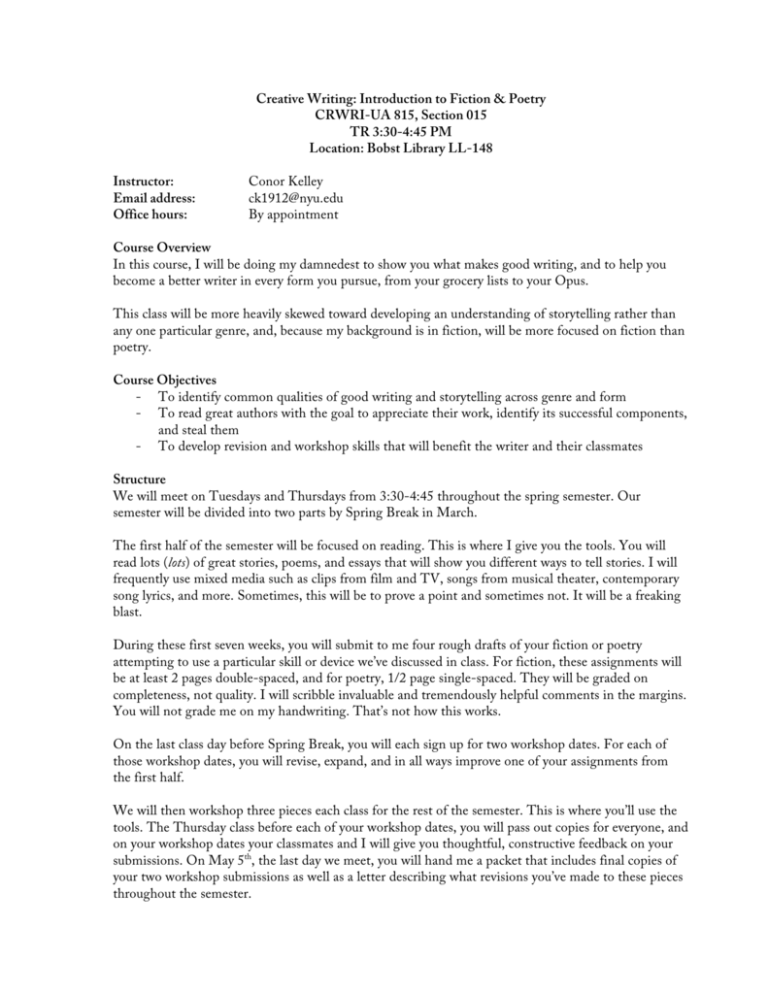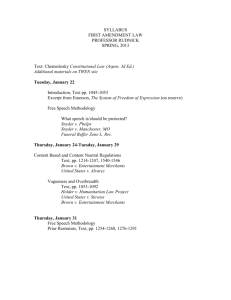Creative Writing: Introduction to Fiction & Poetry CRWRI
advertisement

Creative Writing: Introduction to Fiction & Poetry CRWRI-UA 815, Section 015 TR 3:30-4:45 PM Location: Bobst Library LL-148 Instructor: Email address: Office hours: Conor Kelley ck1912@nyu.edu By appointment Course Overview In this course, I will be doing my damnedest to show you what makes good writing, and to help you become a better writer in every form you pursue, from your grocery lists to your Opus. This class will be more heavily skewed toward developing an understanding of storytelling rather than any one particular genre, and, because my background is in fiction, will be more focused on fiction than poetry. Course Objectives - To identify common qualities of good writing and storytelling across genre and form - To read great authors with the goal to appreciate their work, identify its successful components, and steal them - To develop revision and workshop skills that will benefit the writer and their classmates Structure We will meet on Tuesdays and Thursdays from 3:30-4:45 throughout the spring semester. Our semester will be divided into two parts by Spring Break in March. The first half of the semester will be focused on reading. This is where I give you the tools. You will read lots (lots) of great stories, poems, and essays that will show you different ways to tell stories. I will frequently use mixed media such as clips from film and TV, songs from musical theater, contemporary song lyrics, and more. Sometimes, this will be to prove a point and sometimes not. It will be a freaking blast. During these first seven weeks, you will submit to me four rough drafts of your fiction or poetry attempting to use a particular skill or device we’ve discussed in class. For fiction, these assignments will be at least 2 pages double-spaced, and for poetry, 1/2 page single-spaced. They will be graded on completeness, not quality. I will scribble invaluable and tremendously helpful comments in the margins. You will not grade me on my handwriting. That’s not how this works. On the last class day before Spring Break, you will each sign up for two workshop dates. For each of those workshop dates, you will revise, expand, and in all ways improve one of your assignments from the first half. We will then workshop three pieces each class for the rest of the semester. This is where you’ll use the tools. The Thursday class before each of your workshop dates, you will pass out copies for everyone, and on your workshop dates your classmates and I will give you thoughtful, constructive feedback on your submissions. On May 5th, the last day we meet, you will hand me a packet that includes final copies of your two workshop submissions as well as a letter describing what revisions you’ve made to these pieces throughout the semester. Required Texts College is really expensive. Boo. I’ve compiled our semester’s readings into a free PDF for you all. Yay. You get 500 pages per semester on the NYU printers; this packet will cost you around 450 of them. You will be required to bring the day’s texts to class every day. Grading Classroom participation Final portfolio Bi-weekly assignments 40% 40% 20% Attendance You get two freebie missed classes. These can be used for a much-needed nap, a mental health day, or to tack a day on to your Spring Break. If you are sick and have to miss class, sorry bub: that counts. If you miss a third class, I will need a note from the doctor, the President, or the morgue director— whoever is in charge around there. A third absence without a note will result in a letter grade deducted from your grade. This will hurt you more than me, I promise. Lateness Stop that. I understand running late on occasion, but there reaches a certain point when you’re disrespecting everyone else’s time. That point, in fact, is ten minutes. If you’re ten minutes late, it will count as an absence, which would absolutely be the worst way to use one of your freebie missed classes. You will be expected to get notes on what you missed from your classmates. Plagiarism Don’t. This class is for you to learn what makes good writing and start doing it yourself. This is not show-and-tell. If you try to pass something off as your own, I will catch you, you will be punished (according to NYU’s Plagiarism policies, which are very strict), and you will have wasted your own time and put yourself through a very stressful experience for nothing. If you’re having trouble meeting a deadline, get in touch with me. Electronics in class Put it away. If your phone makes a dingle dingle, you will distract everybody. If you’re typing notes on your laptop, you will be tempted to cruise the Interwebs, because the Interwebs are amazing and you’re a curious George. Let’s stick to pen and paper. Your brain will retain the information better, anyways. Workshop etiquette We will discuss this in great detail before the second half of the semester, but to summarize my expectations: we will all work together to help each piece as if it were our own, and will treat each writer as we would like to be treated. Course Outline Week One Tuesday, 1/25 Getting to Know You: Syllabus Day “Syllabus” by Conor Kelley Thursday, 1/27 How to Use the Time of a Total Stranger: Essays on Writing “Eight Tips on How to Write a Great Story” by Kurt Vonnegut “The Figure a Poem Makes” by Robert Frost “That Crafty Feeling” by Zadie Smith “Fires” by Raymond Carver Week Two Tuesday, 2/2 The Devil is in the Details: Building a Real World Excerpt from Pnin by Vladimir Nabokov Excerpt from Other Voices, Other Rooms by Truman Capote “Flight” by John Updike “The Ones Who Walk Away from Omelas” by Ursula K. LeGuin Thursday, 2/4 It’s Like This, and It Is No Joke: Writing in First-Person “Jon” by George Saunders “Emergency” by Denis Johnson “How to Become a Writer” by Lorrie Moore “The Garden” by Ezra Pound Week Three Tuesday, 2/9 Dispel Every Other Thought: Writing in Second- and Third-Person Excerpt from If On A Winter’s Night a Traveler by Italo Calvino “Hills like White Elephants” by Ernest Hemingway “Dulce et Decorum Est” by Wilfred Owen “The Second Coming” by William Butler Yeats Thursday, 2/11 Cards on the Table: Straightforward Narratives “A Good Man is Hard to Find” by Flannery O’Connor “Because My Father Always Said…” by Sherman Alexie “Where the Sidewalk Ends” by Shel Silverstein “Cathedral” by Raymond Carver “My Flamboyant Grandson” by George Saunders Week Four Tuesday, 2/16 Knowing When to Hold ‘Em: Narratives That Reveal Themselves “In the Cemetery Where Al Jolson Is Buried” by Amy Hempel “The Bear Came Over the Mountain” by Alice Munro “The Truth is a Cave in the Black Mountains” by Neil Gaiman “The Lottery” by Shirley Jackson “Do Not Go Gentle Into That Good Night” by Dylan Thomas Thursday 2/18 Expanding Time: Narratives About a Moment “Bullet in the Brain” by Tobias Wolff Excerpt 2 from Pnin by Vladimir Nabokov “What We Talk About When We Talk About Love” by Raymond Carver “An Occurrence at Owl Creek Bridge” by Ambrose Bierce Week Five Tuesday, 2/23 Reflection: How to Look Back on a Life “The Swimmer” by John Cheever “The Road Not Taken” by Robert Frost “A Rose for Emily” by William Faulkner “Piano” by D.H. Lawrence Thursday, 2/25 The Heart Wants What the Ear Wants: The Sound of Writing Gary Provost quote “SantaLand Diaries” by David Sedaris “The Raven” by Edgar Allen Poe Week Six Tuesday, 3/1 A Sprinkling of Strange: Examples of Surrealism “A Lack of Order in the Floating Object Room” by George Saunders “The School” by Donald Barthelme “Axolotl” by Julio Cortazar “Sea Oak” by George Saunders “The Waste Land” by T.S. Eliot “Car Crash While Hitchhiking” by Denis Johnson Thursday, 3/3 A Pinch of Po-Mo: Examples of Post-Modernism “Incarnations of Burned Children” by David Foster Wallace “A Conversation with My Father” by Grace Paley “The Things They Carried” by Tim O’Brien “Safari” by Jennifer Egan Week Seven Tuesday, 3/8 Facing the Void: Nostalgia, Coming of Age and Other Evergreen Themes “Where Are You Going, Where Have You Been?” by Joyce Carol Oates “Pigeon Feathers” by John Updike “A&P” by John Updike “I Want to Know Why” by Sherman Anderson “Ozymandias” by Mary Shelley “Those Winter Sundays” by Robert Hayden Thursday, 3/10 Four writing assignments due The First Draft of Anything is Shit: Revision “Editing” by David Lipsky “On Rocky Islands Gulls Woke” by George Saunders Week Eight Woo Hoo: Your Spring Break Week Nine Tuesday, 3/22 Week Ten Week Eleven Week Twelve Week Thirteen Building Worlds workshop _______________ _______________ _______________ Thursday, 3/24 1st Person workshop _______________ _______________ _______________ Tuesday, 4/5 2nd and 3rd Person workshop _______________ _______________ _______________ Thursday 4/7 Straightforward Narrative workshop _______________ _______________ _______________ Tuesday 4/12 Revealing Narrative workshop _______________ _______________ _______________ Thursday 4/14 A Moment workshop _______________ _______________ _______________ Tuesday 4/19 Reflection workshop _______________ _______________ _______________ Thursday 4/21 Sound workshop _______________ _______________ _______________ Tuesday 4/26 Surrealism workshop _______________ _______________ _______________ Thursday 4/28 Post-modernism workshop _______________ _______________ _______________ _______________ _______________ Week Fourteen Tuesday 5/3 Evergreen Themes workshop _______________ Thursday 5/5 Final portfolios due A Life of Writing “My Writing Education: A Timeline” by George Saunders






